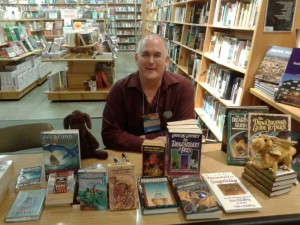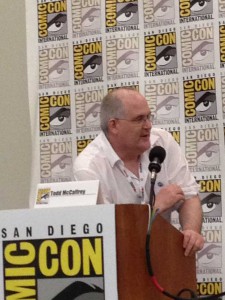We continue our author spotlight with this months featured author Damien Angelica Walters. Damien is a favorite Friday featured author. Her work has appeared 7 times at Daily SF, including this month’s finishing tale.
Android copy finds its creator. Children of Frogs by Morgan Brooks (debut 2/3 and reviewed by Frank D) is the tale of a robotic engineer who escaped the paternal grip of her oppressor. She built a cyborg copy of herself but now the copy has found her. There is no room for identical women in the same place. Someone will need to go.
“Children” is the tale of obligation. The protagonist ran away from her sick father. Her Asian roots committed her to care for him but she was eager for a life on her own. What her cyborg replacement lacked in outward appearance she made up with for an identical inward personality.
I must say this tale perplexed me. Tying the story’s title with its premise is something I completely missed. Piecing together the backstory with the characters motives also eluded me. I don’t know if the man she left behind was a bad guy or just a burden. What I didn’t miss was its moral , you can run from your sins but you can never escape them.
Exchanges in No Man’s Land by C J Paget (debut 2/5 and reviewed by Dustin Adams)
Two women within a VR (I think) are on a secret mission. One is a super spy fully cut out for this type of subterfuge, the other joined to try to change the world through radical peace.
What we discover the true nature of the mission to be, is not what was assumed, but a world-changing technology that if twisted and put in the wrong hands will have catastrophic consequences. Loyalties reverse and doing the right thing becomes pitted against survival.
Pair of Rogues by Jonathan Vos Post (debut 2/5 and reviewed by Dustin Adams)
This story is interesting, insofar as the facts contained within are disseminated with professionalism and lead me to believe they are truth framed in a tale.
The tale is of a narrator observing a planet named Partner, which orbits the same sun. The facts are how it’s possible for planets to leave one solar system and wind up in another.
I felt this story was dry and tell-ish until I read the author comments. Then things made more sense and I appreciated the tale for the author’s intent. I suggest reading them first.
When You Want Another Man’s Girl by Stefanie Freele (debut 2/6 and reviewed by Dustin Adams)
Envy, as mentioned in the author’s notes, is the crux of this micro-flash. The observation is the more things change, the more they stay the same.
An illegal party is a most excellent place to have one’s competition for affection arrested. I wouldn’t call this a twist as much as a revelation, and it’s a wicked one at that.
Grand Kitsch by Jane Elliot (debut 2/7 and reviewed by Dustin Adams)
Interesting and completely believable story about a young girl in our inevitable, amped up future. She figures she’ll try anything once, and the particular anything the story focuses on, is getting married. But it’s not married like it is today, it’s disposable.
The style here is inventive, as if the author time traveled to the future and returned with vivid details of vernacular and how people behave while high (which is how the narrator spends the entire story.) I enjoyed this story more from a writer’s point of view than a reader’s because of the way it’s told, instead of what transpired.
Jesus has returned in Revelations by Brenda Kezar (debut 2/11 and reviewed by Frank D), and he is seeking converts. A reporter investigates a small church’s claims that Jesus lives within the walls. The reporter soon discovers who he really is , immortal, all powerful, and a vampire.
“Revelations” is a faith challenging story. The author explains much on the Biblical version of His miracles with this version but is sure to inflame a few of the faithful with its premise. Proceed with caution if you are a regular church goer.
If She Pushes the Button, Turn to Page 116 by Robert Lowell Russell (debut 2/11 and reviewed by James Hanzelka)
Susan and Phil are exploring their basement, now cluttered with images generated by the paperback manual in Phil’s hands. Susan is amazed at how personal and detailed the text is. Following the text they explore the clutter of Phil’s grandfather that now populated their basement, right down to the dust the images carried in with them. The two follow the path the manual leads them on, flipping from page to page, watching their movements captured on the page. They follow the manual down to the hidden cavern the manual has created under their basement where they find the box housing Phil’s evil twin from the same dimension as the manual.
This story takes a little effort to get into, but if you let it carry you along it can be fun. The plot twists and turns like the ladder the couple follow to the cavern beneath their house (or their make believe house, I was never really sure). The author does a good job using the reflection of the characters off their opposites in the story to build the storyline. Overall a pretty well done effort, give it a read.
Dear John by Sylvia Spruck Wrigley (debut 2/12 and reviewed James Hanzelka)
John Smith
C/o NASA Ceres Project
Dear John.
I’m sorry to tell you this while you are so far away (you must be at the end of the solar system by now) but I think it’s only fair you hear it from me and are not left wondering. Besides we’ve always told each other the truth (although you never did explain Lisa Walter’s panties in your glove box after your going away party). So I wanted to tell you before you heard it from someone else first that I’m seeing someone else. I know we never made a promise to wait for each other, but with how difficult it’s become to find food and drink since we got hit by the plague it’s probably better to move on. And Melvin was so sweet to fight his way through the zombies (they’re not really zombies, that’s just what we call the roaming bands of rioters looking for food after the nuclear exchange) that I just couldn’t send him back outside, so I let him sleep in the spare room. He really has been a godsend.
This is a tragedy in a one page note. The author deftly weaves the dear John letter together with the telling of the disaster that Earth has become after the astronaut left. In spite of the horrific situation the writer describes the humor comes through quite clearly. This one will brighten your day, even if it is just in comparison to how bad things might have been.
Love dies on the infield of a Little League diamond in St Valentine’s Day Mashup by G.O. Clark (debut 2/13 and reviewed by Frank D). An alien with striking resemblance to the mythical Cupi, steps outside his tiny saucer with his bow and arrow in hand and is cut to ribbons by a paranoid military.
“St Valentine’s” is a very amusing, but short, mashup of a couple of different premises. Very funny.
A strange rock brings two people uncomfortably close together. Rob Lithim Used to be Two People by Brynn MacNab (debut 2/14 and reviewed by Frank D) is the tale of an obsessed man and his dysfunctional attempts at maintaining a relationship. He can’t let go of his girlfriend, Tam. Lithim is a close friend (lover?) who happened to be near Rob when he comes into contact of a rock with special powers , condemning the two to be one.
“Rob Lithim” is a strange story that is difficult to grasp. A mish-mash of flashbacks made it cumbersome for me to determine the where and when of disconnected scenes. The story clearly shows Rob as one F’ed up individual who now possess a disturbing superpower. If the tale stuck to that simple frame of a premise, it would have been majestic, but the real story wasn’t about that, but of a needy man’s self-absorbed character. Too bad.
A starving boy hooks the catch of a lifetime in Mermaid by Jonathon Schneeweiss (debut 2/17 and reviewed by Frank D). Izam latches onto a huge fish, but the monstrous catch gets away before he can pull it in. His family needs money and food, the lost fish would have helped them make it through a few more days. So when a mermaid surfaces, holding the squirming fish in her hands, an opportunity of a lifetime is just a net’s throw away.
“Mermaid” is a tale of fortune and empathy. Izam is so hungry he can count the ribs under his skin. His father had told what to do if he were lucky enough to be so close to a mermaid. Catching it will change the fortunes of his family overnight but the beauty and kindness of the creature causes him to question the intentions of his actions. It takes an enticing bait to net a clever catch, a lesson Izam’s dad never taught him.
I have seen many of stories with a premise nearly identical to “Mermaid”. However, the author here managed to package a familiar twist quite nicely. Well done.
A stage of life goes up in flames. Saltcedars by Shannon Peavey (debut 2/18 and reviewed by Frank D) is the story of young woman on the verge of adulthood. The time has come to burn her tamarisk tree , the origin of her birth. Her hopes and expectations of an idealistic youth go up in the flames. It is time for her to move on and wait. From the ashes of the tree will spring a new tamarisk. The next generation awaits.
“Saltcedars” is a tale of growth. The story is set during a time when the children of this community are on the cusp of becoming adults. The trees are phoenix-like anomalies , the old growth is torched to make way for the new. Ms Peavey created a tale that serves as a wonderful metaphor on the uncertainty and anxiety of growing up. A new chapter is turned when we emerge from our innocent youth into the responsibility that is adulthood. Well told.
An instruction guide for a human hosting a parasitic matrimony is What is Expected of a Wedding Host by Ken Liu (debut 2/19 and reviewed by Frank D).
The story is an instructional guide for people about to become a home for advanced alien parasites. Clever but the premise is a familiar one.
All the diamonds and jewels cannot buy peace for a kingdom, or happiness for a marriage. Toads by Mari Ness (debut2/20 and reviewed by Frank D) explores the eventuality of an old fairy tale’s consequences.
“Diamonds and Toads” is a fable I had missed in my youth. The story lacks a satisfying conclusion for me.
A condemned man gets more than one chance. The Seventeen Executions of Signore Don Vashata by Peter M Ball (debut 2/21 and reviewed by Frank D) is the story of immortal man who sentence to death, over and over. The protagonist is one of Vashata’s many executioners. Despite three fail attempts to complete the deed himself, he is called as an consultant by his predecessors on how to proceed with Vashata’s sentence. The protagonist becomes fond with the criminal, even willing to become his friend.
“Seventeen executions” is a commentary on the merits of the death sentence. I believe the author sought to point out the futile of punishment and on how robs its victim of atonement. Vashata is cast as a romantic but flawed man. He has a charm about him. The failed attempts to kill him have left many scars on the man which lend to the sympathy more than one executioner feels for him.
Vashata is cast as a likeable character but I couldn’t help but to notice the nature and acts of his crimes were never explored. His crimes could have been as inconsequential as littering as far as the reader could know. One thing that didn’t escape me, whatever he did more than one jurisdiction , and nation , felt his crimes deserved death as a penalty. There is only one description that would warrant multiple attempts to exterminate an immortal man: a monster. A man like that doesn’t earn freedom because it is too hard to carry out his sentence. A man like that needs to be in cage, as would any monster too dangerous to be allowed to roam free.
Inebriation gets a lot simpler. Fermentation by Christopher Kastensmidt (debut 2/24 and reviewed by Frank D) is the tale of a fungus that turns any stomach into its own brewery.
Silly and frightening. I agree with the author, way too many people would willingly accept this infliction, damn the consequences.
All the town is abuzz when Miss Violet May from the Twelve Thousand Lakes by Tina Connolly (debut 2/25 and reviewed by Frank D) arrived into town. Miss May is a girl from the far north that has come south to marry a local boy. There are rumors that frightening ghosts live up there, but Miss May seems far too cheerful to have come from a place like that. Married life proves to be not it’s all cracked up to be. The smile, and Violet, slowly begins to fade away with each passing day.
“Miss Violet May” is a metaphor on failing relationships. The protagonist in this story is another man who is sweet on the married woman. To him it is apparent that Violet married the wrong man. I was appalled by Miss May’s decision in the end, and like many woman who find the courage to opt out of violent relationship, I do hope she found herself again.
Be wary of the local cuisine. La Paella by Sylvia Spruck Wrigley (debut 2/26 and reviewed by Frank D) is a letter of regret from a diplomat. He wasn’t as careful as he needed to be when he made his choice of picking clams on the beach.
This one is another in Ms Wrigley’s Postmark Andromeda series. A man’s eagerness to break a bland diet lands causes an interstellar incident.
A meat packing company is rewarded an unusual contract in On Disposing of a Corpse by Tom Jolly (debut 2/27 and reviewed by Frank D). The company paid for the rights of salvaging the remains of an icon. Although the cleanup was costly, they more than made their money back on novelty sales.
Interesting look at the after effects of a well-known classic. I love this type stories.
Green is for Silence, Blue is for Voice, Red is for Whole, Black is for Choice by Damien Angelica Walters (debut 2/28 and reviewed by Frank D). The protagonist of this apocalyptic tale is a young woman named Leda. She is a survivor, one of the lucky few healing in a futuristic regeneration ward. The war has left the Earth devastated and humankind scarred and disfigured. Medical science works feverishly to heal the repairable, but the damage is extensive. Therapy and time is needed, but how much time no one can know.
“Green is for Silence” is a grim story. One could argue that the theme is one of hope but the sheer devastation that is only hinted about, would be more for any ordinary person to comprehend. Leda is just like all the other patients of the ward , alone, mutilated, and without a future. Everyone she ever knew and all she ever had is gone. All she has left to look forward to is a life where she can feel whole again. The wait will be a log one.
Leda’s journey in this bleak tale takes a turn toward the end. It completes the moral of the piece , time heals all wounds. The conclusion leaves the protagonist with a life of uncertainty, but it is a life where she can make her own choices once again.
The Scary Career of a Prolific Writer
Daily Science Fiction is a treasure chest of jewels. This unique publication has proven to serve as an excellent metal detector for the precious gold that lies right under our feet, and Damien Angelia Walters (previously known as Damien Walters Grintalis) is one of the brightest gems they have brought to my light.
To share the vast wealth of published material she has to her credit would take pages for me to write, but an excellent example of her talent is her debut horror novel Ink. The many reviews I have read about it our quite glowing (and also too numerous for me to share), but Horror Review’s own Christine Morgan summed up the larger consensus by describing it as†�
INK, the book, is a gorgeous piece of work, with a rich and enticing cover. INK, the story on the inside, is also a gorgeous piece of work†�
†�and later stating†�
Debut novels should not be this good
We wanted to know about Ms Walters in hopes of uncovering the magic elixir that makes her such a good writer.
1) What do you consider to be your greatest accomplishment as a writer?
I think my greatest accomplishment is realizing that there is no one accomplishment. Writing is a continuous series of accomplishments, both small and large, like selling a story to a magazine I thought of as a white whale, and then selling a second story to that same magazine, or being able to look back at an older story and see how much I’ve grown as a writer.
2) Who would be your choice as the best undiscovered/ up and coming author in short fiction today?
Although they’re not undiscovered, I’d like to first give mentions to two of my favorite short fiction authors: Sunny Moraine and E. Catherine Tobler. Their prose and their stories make my heart hurt, in the best possible way.
Honestly, it’s hard for me to designate who is up and coming and who is not.
Some other authors who I’ve only read a few stories from but think they’re on the right path to eventually be very well known are Usman Tanveer Malik, Martin Cahill, and Brooke Bolander, although in truth, Ms. Bolander has had quite a few stories published in high profile magazines so she might not be up and coming but already arrived.
3) Do you have a recommendation for a Daily Science Fiction tale for us? The one story you think is a must read for the lovers of speculative fiction?
Tastes are so very subjective. All too often, one person’s must reads are another person’s did not finish, so I’ll simply point out two DSF stories that I adore:
Tell Me How All This (and Love too) Will Ruin Us by Sunny Moraine
Falling From Earth to Haphazard Sky (Tadpole Remix) by E. Catherine Tobler
 Damien Angelica Walters’ work has appeared or is forthcoming in various magazines and anthologies, including Lightspeed, Nightmare, Year’s Best Weird Fiction Volume One, Strange Horizons, Apex, and Glitter & Mayhem. Sing Me Your Scars, and Other Stories, a collection of her short fiction, will be released in Fall 2014 from Apex Publications.
Damien Angelica Walters’ work has appeared or is forthcoming in various magazines and anthologies, including Lightspeed, Nightmare, Year’s Best Weird Fiction Volume One, Strange Horizons, Apex, and Glitter & Mayhem. Sing Me Your Scars, and Other Stories, a collection of her short fiction, will be released in Fall 2014 from Apex Publications.

 Prolific Science Fiction-Detective-Humor writer Richard Zwicker has sold thirty stories to twenty-two markets in five and a half years. That’s a sale about every two months. How does he do it?
Prolific Science Fiction-Detective-Humor writer Richard Zwicker has sold thirty stories to twenty-two markets in five and a half years. That’s a sale about every two months. How does he do it? Carl Slaughter is a man of the world. For the last decade, he has traveled the globe as an ESL teacher in 17 countries on 3 continents, collecting souvenir paintings from China, Korea, Thailand, Vietnam, and Egypt, as well as dresses from Egypt, and masks from Kenya, along the way. He spends a ridiculous amount of time and an alarming amount of money in bookstores. He has a large ESL book review website, an exhaustive FAQ about teaching English in China, and a collection of 75 English language newspapers from 15 countries.
Carl Slaughter is a man of the world. For the last decade, he has traveled the globe as an ESL teacher in 17 countries on 3 continents, collecting souvenir paintings from China, Korea, Thailand, Vietnam, and Egypt, as well as dresses from Egypt, and masks from Kenya, along the way. He spends a ridiculous amount of time and an alarming amount of money in bookstores. He has a large ESL book review website, an exhaustive FAQ about teaching English in China, and a collection of 75 English language newspapers from 15 countries. Damien Angelica Walters’ work has appeared or is forthcoming in various magazines and anthologies, including
Damien Angelica Walters’ work has appeared or is forthcoming in various magazines and anthologies, including  affrey
affrey


